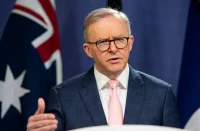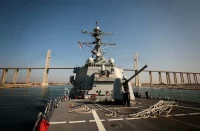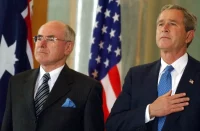Syria has entered the sixth month of anti-government riots, orchestrated from abroad. Protesters no longer seek moderate reforms, they aggressively demand Bashar Assad`s resignation. Western media accuse Damascus of ‘opposing democratic changes’. The former US Assistant Secretary of the Treasury, Craig Roberts, had earlier explained what these changes were about: “We need to topple Gaddafi in Libya and Assad in Syria because we want to oust China and Russia from the Mediterranean” (‘US risks war with China and Russia’).
Russia has a naval base in Syria`s Tartus, the only place in the Mediterranean where the Russian fleet has its warships stationed. In 1991 Russia reformed its Mediterranean squadron, and since then has sailed to the area only several times. Meanwhile, the US and NATO presence there is not decreasing.
The base in Tartus was established to replace one in Sevastopol if Ukraine bans Russia from having its navy there. There is an alternative port in Novorossiysk but it can`t accommodate as many ships as the one in Sevastopol. On ousting Russian sailors from Syria, Americans will fulfill their goal. That is why Washington is being so persistent in trying to topple Bashar Assad, who is Russia`s ally. The day Assad leaves, Russian sailors will be asked to quit, too. The next step for Washington will be to oust Russia’s Black Sea Fleet from Crimea to Novorossiysk. After that Russia will no longer remain in the list of countries enjoying naval presence in the west.
However, Turkey may affect these plans. Ankara has been and remained Syria`s ally. They had friendly cooperation even when ‘western democrats’ urged Syria to use force while dealing with protesters. With time Turkey`s attitude to the Syrian issue changed. Now they call the Syrian crisis ‘a struggle for freedom’ and have hosted two conferences chaired by Syrian opposition supporters who said Assad`s rule should be ended. The number of Syrian refugees has increased, more than 11,000 have already reached Turkey by now. Now Ankara urges Damascus to use force against demonstrators. The Turkish government is trying to regain its positions in Syria – in case the US ousts Assad.
Strategically, Syria is a very important country. Located between Turkey, Lebanon, Iraq, Israel and Jordan, Syria cooperates with Hizballah and HAMAS, – and this fact could not be ignored by Washington: Syria was placed on the list of states comprising ‘axis of evil’. The fact that Damascus has friendly ties with neighboring Tehran can neither be ignored. Though it had never been manifested clearly enough, the Tehran-Damascus alliance has always been a matter of concern for Washington and Tel-Aviv. Syria can influence Lebanon`s policy and balance of power in post-Saddam Iraq. Attempts made by Israel and US to isolate Damascus by means of diplomacy have brought no results. Syrians have established contacts with Russia, China, South America.
Turkey views Syria as an excellent opportunity to affect the situation in Iraq`s Kurdistan. Syria is home to over 1,5 million Kurds, and the Kurdish issues is one of the thorniest in Turkish-American relations. The fact that Washington was focusing on this issue while playing its game against Turkey resulted in Ankara trying to be more independent in terms of international policy. Turkey has also been trying to become a mediator in Syria-Israel dialogue. Ankara was left puzzled at the Syrian unrest: long-term geopolitical plans make Turkish authorities remain closer to Bashar Assad, which creates just new difficulties in Turkey-Washington relations and with pro-American regimes in the Arab world.
To conclude, I would like to say the following:
– in case riots in Syria end in Assad`s resignation, Syria will be controlled by the US
– Turkey, Russia and Iran will have its positions in the Middle East weakened
– Russia will be ousted form the Mediterranean and locked inside the Black Sea basin, where it will have to deal with Romania, Bulgaria and Georgia – US allies and anti-Russian foreign policies
– the Kurdish issue will become even a greater threat for Turkey, especially in view of the fact that a pro-American Assad`s successor won`t be opposing what Kurdish rebels are going to implement on Syrian territories
– Al-Qaida has already voiced its support to Syrian rioters, and it appears that they are going to strengthen their position in post-Assad Syria, the fact which Ankara cannot favor; but this will allow Washington justify its military presence in the region
– If Assad steps down, Turkey will face huge economic losses (in 2010 bilateral trade between Syria and Turkey stood at $2.5bln, and the sides agreed to reach the $5bln level)
– If this all happens, Turkey will have no alternative but to abandon its ambitious plans to create a free trade zone with Syria, Jordan and Lebanon.
Source: Strategic Culture Foundation














Comments